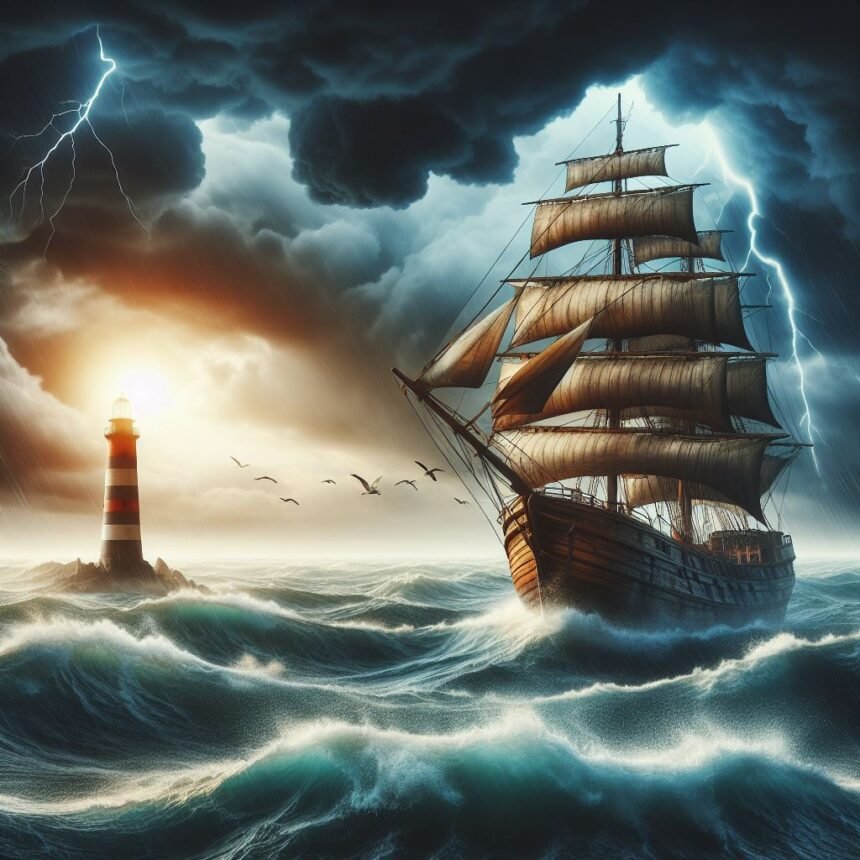Marine insurance can be traced back to ancient times when merchants would pool their resources to protect their goods during long and perilous sea voyages. These early forms of marine insurance were informal agreements between merchants and ship owners, where the merchants would contribute a portion of the value of their cargo to a common fund. If a ship was lost or damaged during the voyage, the funds would be used to compensate the merchants for their losses.
As maritime trade expanded in the Middle Ages, so did the need for more formalized insurance arrangements. In response to this growing demand, specialized marine insurance policies began to emerge. These policies provided coverage not only for the cargo but also for the ships themselves, as well as for the various risks associated with maritime activities, such as piracy and war.
During the Age of Exploration in the 15th and 16th centuries, marine insurance became even more essential. As European nations ventured into uncharted waters in search of new trade routes and colonies, the risks involved in maritime activities increased exponentially. Marine insurance played a crucial role in enabling these expeditions by providing financial protection against the uncertainties of the sea.
Over time, marine insurance evolved to meet the changing needs of the maritime industry. In the 18th and 19th centuries, the growth of industrialization and the expansion of global trade led to the development of specialized marine insurance markets in major port cities around the world. These markets, known as marine insurance hubs, became centers of expertise and innovation in the field of marine insurance.
Today, marine insurance continues to be a vital component of the global economy. It provides coverage for a wide range of risks, including physical damage to ships and cargo, liability for accidents or pollution, and loss of income due to business interruption. The marine insurance industry has adapted to the challenges of the modern world, incorporating new technologies and risk assessment models to better serve its clients.
In conclusion, marine insurance has a rich history that spans centuries. From its humble beginnings as informal agreements between merchants to its current status as a sophisticated and specialized field of insurance, marine insurance has played a crucial role in facilitating global trade and mitigating the risks associated with maritime activities.
As the demand for maritime trade grew during the Renaissance period, so did the need for more sophisticated insurance mechanisms. In response to this, Lloyd’s of London, one of the most iconic institutions in the history of marine insurance, was established in the late 17th century.
Lloyd’s of London initially started as a coffee house where merchants, shipowners, and underwriters would gather to discuss and negotiate insurance deals. This informal gathering eventually evolved into a formal organization that specialized in marine insurance. Lloyd’s became known for its ability to assess risk and provide coverage for a wide range of maritime perils.
During the Age of Exploration, as European nations ventured into new territories across the globe, the risks associated with long-distance voyages became even more apparent. The discovery of new trade routes, such as the Cape of Good Hope and the Americas, presented both opportunities and challenges for merchants and insurers alike.
With the expansion of colonial empires, the insurance industry adapted to meet the changing needs of the maritime trade. Insurance policies were developed to cover not only the cargo but also the vessels themselves. This shift marked a significant milestone in the evolution of marine insurance, as it recognized the importance of protecting the physical assets involved in maritime commerce.
Over time, marine insurance expanded beyond the realm of individual merchants and shipowners. It became an integral part of international trade, with governments and corporations relying on insurance to safeguard their interests. Today, marine insurance plays a crucial role in the global economy, providing coverage for a wide range of risks, including hull damage, cargo loss, and liability claims.
In conclusion, the origins of marine insurance can be traced back to ancient times, where merchants sought ways to mitigate the risks of maritime trade. From the pooling of resources in ancient Greece and Rome to the establishment of Lloyd’s of London and the development of comprehensive insurance policies, marine insurance has evolved to meet the ever-changing needs of the maritime industry. Its importance in protecting assets and facilitating international trade cannot be overstated.
The Development of Marine Insurance as an Industry
Over time, marine insurance evolved into a distinct industry, with specialized insurers and brokers offering coverage for various risks associated with maritime activities. The growth of international trade during the 17th and 18th centuries further fueled the demand for marine insurance.
Marine insurance played a crucial role in the expansion of global trade routes and the establishment of colonies. It provided the necessary financial protection for merchants and shipowners, encouraging them to undertake risky voyages that contributed to the growth of commerce and exploration.
During this period, marine insurance policies became more standardized, with insurers offering coverage for specific risks such as shipwrecks, piracy, and damage to cargo. The development of insurance markets in major maritime cities, such as London and Amsterdam, further facilitated the growth of marine insurance as a distinct class of insurance.
As the industry grew, insurers began to collaborate and form associations to establish common practices and standards. One such association was the Lloyd’s of London, which originated as a coffee house where shipowners, merchants, and insurers would gather to discuss and negotiate insurance contracts.
The establishment of Lloyd’s of London in the late 17th century marked a significant milestone in the development of marine insurance. It provided a centralized marketplace where insurers and brokers could meet, exchange information, and underwrite policies. This innovation not only streamlined the insurance process but also facilitated the sharing of risk among multiple insurers, known as reinsurance.
With the rise of industrialization in the 19th century, the demand for marine insurance continued to grow. The advent of steam-powered ships and the expansion of global trade routes presented new risks and challenges that required specialized insurance coverage.
Insurers responded by developing new policies to address these emerging risks, such as coverage for machinery breakdown, collision, and loss of profits due to delays. The marine insurance industry also expanded its reach beyond traditional maritime activities to include coverage for inland transportation, such as railways and canals.
Today, marine insurance remains a vital component of the global economy, providing coverage for a wide range of risks associated with shipping and transportation. From the protection of cargo to liability coverage for shipowners, marine insurance plays a crucial role in facilitating international trade and ensuring the smooth operation of the maritime industry.
Furthermore, marine insurance serves as a safeguard for ship owners and operators, who face numerous risks while navigating the world’s oceans. From natural disasters such as storms and hurricanes to man-made hazards like piracy and terrorism, the perils faced by vessels at sea are diverse and ever-present.
For ship owners, the financial implications of a loss or damage to their vessel can be catastrophic. The cost of repairing or replacing a ship can run into millions or even billions of dollars, not to mention the potential loss of income during the time the vessel is out of commission.
Similarly, cargo owners rely on marine insurance to protect their goods during transit. Whether it’s raw materials being transported to a manufacturing plant or finished products being shipped to customers around the world, the value of the cargo can be substantial. Any loss or damage to the cargo can result in significant financial losses for the owner.
Moreover, marine insurance provides liability coverage for ship owners and operators. In the event of an accident or incident at sea that causes harm to third parties or their property, the costs of legal defense and potential compensation can be astronomical. Marine insurance ensures that ship owners are protected from these liabilities and can continue their operations without fear of bankruptcy.
Lastly, marine insurance has an important role in protecting the environment. The maritime industry, while essential for global trade, can have a detrimental impact on marine ecosystems. Accidental oil spills, pollution from ship emissions, and damage caused by underwater noise are just a few examples of the environmental risks associated with maritime activities. Marine insurance policies often include coverage for these types of environmental damages, encouraging ship owners and operators to take necessary precautions and minimize their impact on the oceans.
In conclusion, marine insurance remains a crucial component of the global economy and international trade. It provides financial security for ship owners, cargo owners, and other stakeholders in the maritime industry. Additionally, marine insurance plays a vital role in protecting the environment by incentivizing responsible practices. As the world becomes increasingly interconnected, the need for marine insurance will only continue to grow, ensuring the smooth and secure flow of goods and services across the oceans.
The Future of Marine Insurance
As the global economy and the maritime industry continue to evolve, marine insurance will also need to adapt to new challenges and risks. Emerging technologies, such as autonomous ships and blockchain, have the potential to revolutionize the maritime sector and, consequently, the marine insurance industry.
Autonomous ships, for example, may require new types of coverage to address the unique risks associated with unmanned vessels. Insurers will need to develop policies that account for potential malfunctions or hacking attempts that could lead to accidents or cargo loss. Additionally, the liability aspect of autonomous ships will need to be carefully considered. Who will be held responsible in case of an accident? Will it be the ship owner, the manufacturer of the autonomous system, or the software developers?
Similarly, blockchain technology can enhance transparency and efficiency in marine insurance transactions, reducing administrative costs and improving claims management. By utilizing a decentralized and immutable ledger, insurers can streamline the underwriting process, verify the authenticity of documents, and automate claims settlement. This technology can also provide a more accurate assessment of risk, allowing insurers to offer tailored coverage based on real-time data.
Furthermore, the increasing focus on sustainability and environmental protection is likely to influence the development of marine insurance. Insurers may need to offer specialized coverage for environmental risks and ensure that insured vessels comply with stringent environmental regulations. This could include coverage for oil spills, pollution damage, and fines resulting from non-compliance with environmental standards. Insurers will also need to assess the environmental impact of vessels before providing coverage, taking into account factors such as fuel efficiency, emissions, and waste management practices.
In addition to technological advancements and environmental concerns, geopolitical shifts and emerging risks, such as cyber attacks and piracy, will also shape the future of marine insurance. Insurers will need to stay updated on global trends and continuously assess the evolving risks to provide comprehensive coverage for their clients.
In conclusion, the future of marine insurance will be shaped by a combination of technological advancements, environmental considerations, and emerging risks. Insurers will need to embrace innovation, adapt their policies, and collaborate with industry stakeholders to ensure the continued protection of maritime assets and the sustainability of the marine insurance industry.










